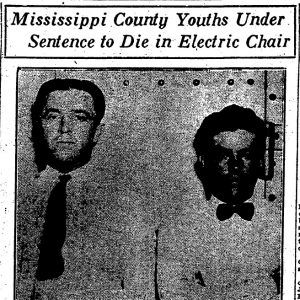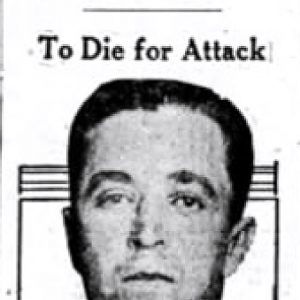calsfoundation@cals.org
Bethel-Wallace Rape Trial of 1929
The case of Frank Bethel and Mike Wallace, two white men tried for rape in Mississippi County in 1929, was an explosive episode in Depression-era Arkansas, attracting attention from across the state and twice reaching the Arkansas Supreme Court. It exemplifies the leniency or favoritism that certain criminal defendants—often well-connected white men—enjoyed during the Jim Crow era.
On April 1, 1928, Bethel and Wallace were arrested in Poplar Corner (Mississippi County), an unincorporated community in the Arkansas Delta, for sexually assaulting a young white schoolteacher named Pearl. As Pearl would later testify, the two men had offered her a ride to the bus station but then kidnapped and raped her in a ditch by the railroad tracks. Later that evening, she led the police to a country store and watched as the authorities arrested the pair. Bethel, a barber, and Wallace, a farmer, were childhood friends and longtime residents of Mississippi County; both had grown up in Monette (Craighead County).
In just a little over a week, a jury in a packed Blytheville (Mississippi County) courtroom would convict the two of rape and sentence them to die. It was the first Mississippi County case to result in the death penalty for some time, and the first rape case in Arkansas to result in a death sentence in six years. Swiftly, however, the Arkansas Supreme Court stayed Bethel and Wallace’s executions and then overturned their convictions, saying that the trial court had erred in allowing a physician to testify that the two defendants had tested positive for a sexually transmitted infection and in allowing the prosecution to “prove the good reputation of the prosecutrix for virtue and chastity” when her “reputation for chastity” was not “in issue.” The Arkansas Supreme Court sent the case back to Mississippi County.
On April 10, 1929, Bethel and Wallace’s second trial began. It was, once again, a high-profile event, and townspeople crowded the courtroom. After a morning of jury selection, the attorneys began opening statements. Speaking on behalf of the two defendants was E. E. Alexander, a former state senator and one of the most prominent attorneys in the county. Alexander’s representation is the first indication that Bethel and Wallace may have been politically connected or otherwise had sufficient social standing to obtain top-notch legal talent. Alexander told the jurors—all twelve of whom were white men—that Pearl was promiscuous, referring to her in derogatory and sarcastic tones.
The next day, Pearl was the first witness to testify. The Blytheville Courier-News described her as a “pretty young school marm.” She identified the two defendants as her attackers and testified that she had “resisted all I could.” In his cross-examination, Alexander implied that she had invited the two men’s attention, that she had affairs with many men, and that she was “a drinking woman.” In the days that followed, a series of witnesses—including Bethel and Wallace themselves—also testified.
On April 12, 1929, the jurors convicted Bethel and Wallace of assault with intent to rape. They had debated for several hours; although all the jurors agreed that the two men were guilty, they were divided over the penalty they should face. After dinner, the jurors agreed to convict the two men of assault with intent to rape, resulting in a sentence of eighteen years in prison. Yet the men would remain at large for more than six months, out on bond as Alexander, their attorney, prosecuted their appeals.
Even after they were finally taken back into custody on November 18, 1929, Bethel and Wallace were consigned to “The Walls,” as the Arkansas State Penitentiary was known, the most comfortable prison in Arkansas at the time. According to one former inmate, this was “where the prisoners who had any political pull stayed.” The Walls was surrounded by lush gardens and croquet lawns; inside, the prisoners were spared the backbreaking labor borne by those incarcerated at Tucker and Cummins prison farms. It is unclear why Bethel and Wallace were granted such a privilege, but surviving evidence indicates that both men had considerable advantages within the penal system. During his time at The Walls, for instance, Wallace was allowed to serve as a trusty—a prisoner who was given a gun and tasked with guarding other prisoners.
In August 1930, after less than a year behind bars, Bethel and Wallace received ninety-day furloughs from Governor Harvey Parnell and returned home to Mississippi County. By this point, the two had begun seeking executive clemency. According to press reports, their clemency petitions contained recommendations from the judge who heard their trial, the prosecutor who brought charges against them, the sheriff who oversaw their arrests, and many of the county’s leading citizens. Six-month furloughs followed in March 1931, and then indefinite furloughs in October. In 1934, Governor Junius M. Futrell granted Wallace a full pardon, concluding “one of the hardest fought legal battles here in a number of years,” according to the Courier-News. Bethel received his in 1936. Upon their release, both men married. Bethel lived until 1952, Wallace until 1983.
For additional information:
“Bethel and Wallace Freed Under Bond Pending Appeal.” Blytheville Courier-News, April 15, 1929, p. 1.
“Bethel and Wallace Get Furloughs.” Blytheville Courier-News, August 23, 1930, p. 1.
“Bethel and Wallace Win Chance for Life.” Blytheville Courier-News, November 5, 1928, p. 1.
Bethel v. State, 10 S.W.2d 370 (Ark. 1928).
Bethel v. State, 21 S.W.2d 176 (Ark. 1929)
Case file, Bethel v. State, 21 S.W.2d 176 (Ark. 1929), on file with the University of Arkansas at Little Rock.
“Death Penalty Is Sought for Two.” Arkansas Gazette, April 11, 1928, p. 7.
“Few Executed on Assault Charges.” Arkansas Gazette, April 15, 1928, p. 5.
“Frank Bethel Given Pardon.” Blytheville Courier-News, August 15, 1936, p. 1.
“Indefinite Furloughs for Two Convicted of Attack.” Arkansas Gazette, October 10, 1931, p. 24.
“Mike Wallace Is Given Pardon.” Blytheville Courier-News, September 19, 1934, p. 1.
Mikel, Elmer. Uncle Tom’s Prison. N.p.: 1970.
“Officers Did Not Request Furlough.” Arkansas Gazette, March 31, 1931, p. 2.
“Pair Convicted of Attacking Teacher.” Arkansas Gazette, April 13, 1929, p. 14.
Prison file of Frank Bethel. On file with the Arkansas Department of Corrections, Pine Bluff, Arkansas.
Prison file of Mike Wallace. On file with the Arkansas Department of Corrections, Pine Bluff, Arkansas.
“School Teacher State Witness in Bethel Trial.” Blytheville Courier-News, April 11, 1929, pp. 1, 3.
Stern, Scott W. There Is a Deep Brooding in Arkansas: The Rape Trials That Sustained Jim Crow, and the People Who Fought It, from Thurgood Marshall to Maya Angelou. New Haven, CT: Yale University Press, 2025.
“Two Given Death on Assault Charge.” Arkansas Gazette, April 12, 1928, p. 12.
“Two Sentenced to Be Killed June 1.” Arkansas Gazette, April 14, 1928, p. 22.
Scott W. Stern
Oakland, California








Comments
No comments on this entry yet.